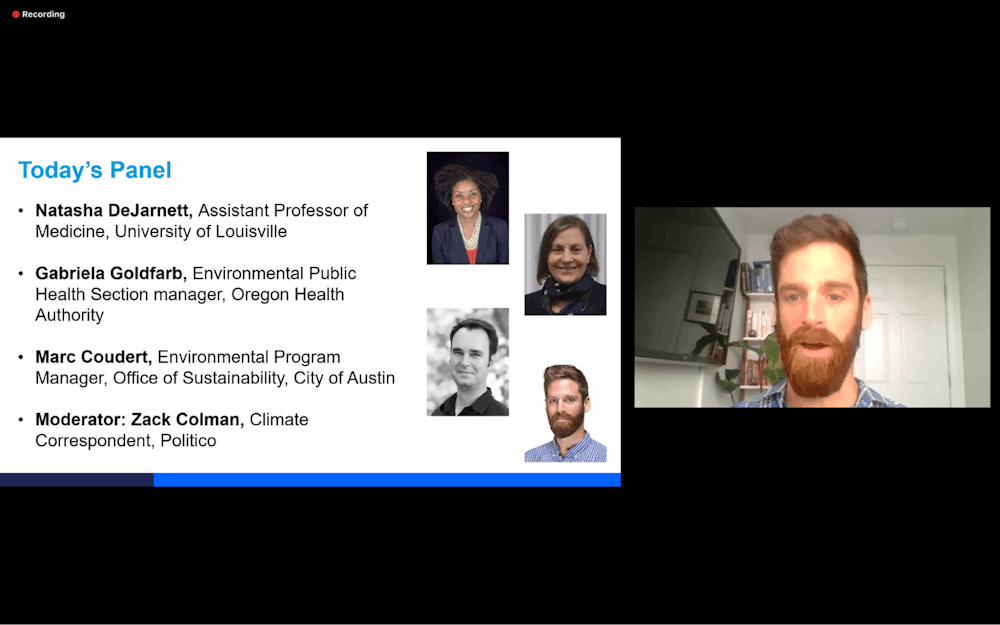Panelists Natasha DeJarnett, Gabriela Goldfarb and Marc Courdert shared their expertise on infrastructure built for climate change at a School of Public Affairs webinar on Oct. 7.
Professionals in the “Building a Resilient Future: Infrastructure that protects the health of all communities from climate-fueled extreme weather” event discussed the impacts of climate change on public health. Some policies are being put in place now that can help, but the panelists discussed the importance of a united front in fighting climate change.
Miami-Dade County Mayor Daniella Levine Cara opened the event. Miami is a “ground zero” for climate issues like natural disasters that have immensely impacted the Florida communities, Cara said. She said she plans on starting a heat health task force, planting more trees for shade, switching to sewer systems and expanding nature-based infrastructure to combat the effects of these disasters.
“We’ve made it a top priority to incorporate extensive community input from residents, business owners, cities, and other stakeholders,” Cara said. “We’ve prioritized the overwhelming support for infrastructure improvements that include nature-based approaches.”
Natasha DeJarnett, an assistant professor of medicine at the University of Louisville, brought up the discussion of green spaces. In areas with less green space, there are higher temperatures and poorer air quality which increases the risk of chronic illnesses, respiratory issues and cardiovascular problems over time, according to DeJarnett. However, in areas with more green covered, there are better heart and lung outcomes, better mental health and better outcomes for extreme weather events and flooding, DeJarnett said.
Green spaces are an example of the type of climate infrastructure that is lacking in impoverished communities, in turn causing numerous health issues.
“There is a lack of resources in these communities that support protection from extreme weather or extreme heat events,” DeJarnett said.
Marc Coudert, an environmental program manager in Austin, focused on the lack of resources in lower-income communities. He says that there has been a lack of investment in low income communities and in turn they have been exposed to polluted water and other climate related issues like mosquitos from higher temperatures in Austin.
All three panelists agreed that increasing green space is a top priority to reduce the impact of rising temperatures and are pushing the public to see climate change as a public health issue.
Coudert, DeJarnett and Goldfarb discussed the importance of keeping the public informed and they want to build education around climate change for the general public and the public health system.
“We want to develop this capacity in our practice to be able to educate our patients to be able to engage in the community on these issues,” said Goldfarb, who is the environmental public health manager at Oregon Health Authority.
Panelists also discussed the social and emotional impacts of climate change. Evacuation during a severe weather event is not always possible especially for the homeless, lower-income, disabled or undocumented population, DeJarnett said. The consequences of natural disasters are life-altering for people with no insurance or people living in subpar housing that is not resilient enough to withstand these events.
Coudert brought up the fact that the traumas of job and housing insecurity as well as dealing with death from natural disasters hugely impact mental health in these vulnerable and high need communities.
Goldfarb introduced Oregon’s new program that is working on the mental health aspect of climate change.
“We just launched actually last week a new disaster resilience learning collaborative, bringing together leaders of BIPOC communities, organizations and tribal health folks …... to acknowledge and identify what the mental health impacts are and how to build resilience in their communities,” Goldfarb said.
While there is a lot of talk about the negative impacts, the panelists also acknowledged the wins, like the Clean Air Act that reduced air pollution significantly.
Despite working in different cities across the U.S., all three panelists have been dealing with the same climate changes and health consequences. They emphasized the immediate need for change and expressed their concerns for the future of our communities if we do not act now.
DeJarnett provided advice to attendees: “Finding yourself in fellowship with others that share your same mission and vision to do something about it can also help ease the eco burden that comes with climate change.”





